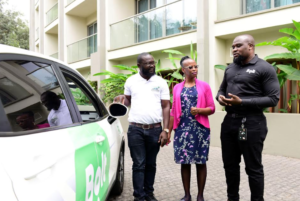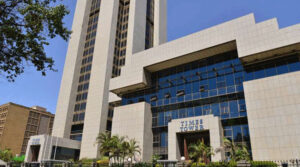KCB, UNITAR Launch 100,000 Electric Motorbikes Project

KCB has partnered with the United Nations Institute for Training and Research (UNITAR) to roll out a programme that will see 100,000 riders benefit from electric motorbikes over the next 6 years.
This is expected to create over 150,000 new green jobs in the boda-boda sector.
The Bank will provide green affordable loans to the riders to acquire electric bikes and tuk-tuks through local electric motorbikes sellers.
The project was commissioned by the Cabinet Secretary, Roads and Transport Kipchumba Murkomen in Nairobi and has been rolled out in Machakos county with a plan to extend it to all counties through the period.
The move is in line with KCB Group’s commitment to enhance sustainable finance, consequently accelerating the transition to a low-carbon resilient economy. Currently, the Group has set a target of transitioning 25% of its total loan portfolio to green investments by 2025, as part of its Net Zero ambition.
KCB Group CEO Paul Russo said: “The initiative is in line with our commitment to increasing our green lending loan portfolio by working with like-minded partners to enhance green job creation and attaining the net zero ambitions.”
“We seek to make it possible for players in the transport sector to acquire electric motorbikes at an affordable rate and earn a living. At the same time, the boda-boda riders play a key role in reducing carbon emissions in the environment, which is part of our long-term plans to conserve the environment,” Russo said.
The programme is aligned to the government’s plans to roll out an electric vehicle public transport system that seeks to bring down the cost of transport for all stakeholders. This is aligned to the government’s economic transformation agenda and climate action, which is also expected to reduce the country’s carbon emissions.
Cabinet Secretary, Roads and Transport Kipchumba Murkomen said “The government has prioritized the adoption of e-mobility, to achieve a number of targets. There is a need to reduce carbon emissions by 32% by 2030. In 2022 emissions in the transport sector were estimated to be 1.26 million tonnes of carbon dioxide.”
“The adoption of electric motorbikes by boda-boda riders will help the country to achieve this target given that 1CE motorcycle emits more carbon than two saloon cars” added Murkomen.
Over 60 youth boda-boda riders drawn from across Nairobi were the first recipients of the electric boda-bodas today, following comprehensive training on electric bikes, the rule of law, customer service and mastering conflict resolution. The youth will also get training in Business Development and Entrepreneurship.
To qualify for the loan, the youth participants are obligated to undergo a mandatory training covering technical skills training, capital and business management, safety and peace building under KCB Foundation’s 2jiajiri youth programme. This is to enable them to qualify for green loans from KCB micro bankers.
The transport sector is the second highest contributor of GreenHouse Gas (GHG) emissions in the country and has been identified as a focus sector in Kenya’s enhanced National Determine Contribution (NDC) commitments and National Climate Change Action Plan.
KCB launched 2jiajiri in 2016, a programme that seeks to formalize the informal sector and skill for self-employment targeting the youth and small businesses. It focuses on growing youth micro-businesses in the informal sector, bringing them to a place where they can employ others.
Since its inception, 20,736 youth have received skills training and the bank has disbursed over KShs. 246 million loans to the youth as capital and asset financing, which has resulted in 64,380 jobs being directly created. A total of 3,402 small businesses are under incubation within the business development phase of the programme.








